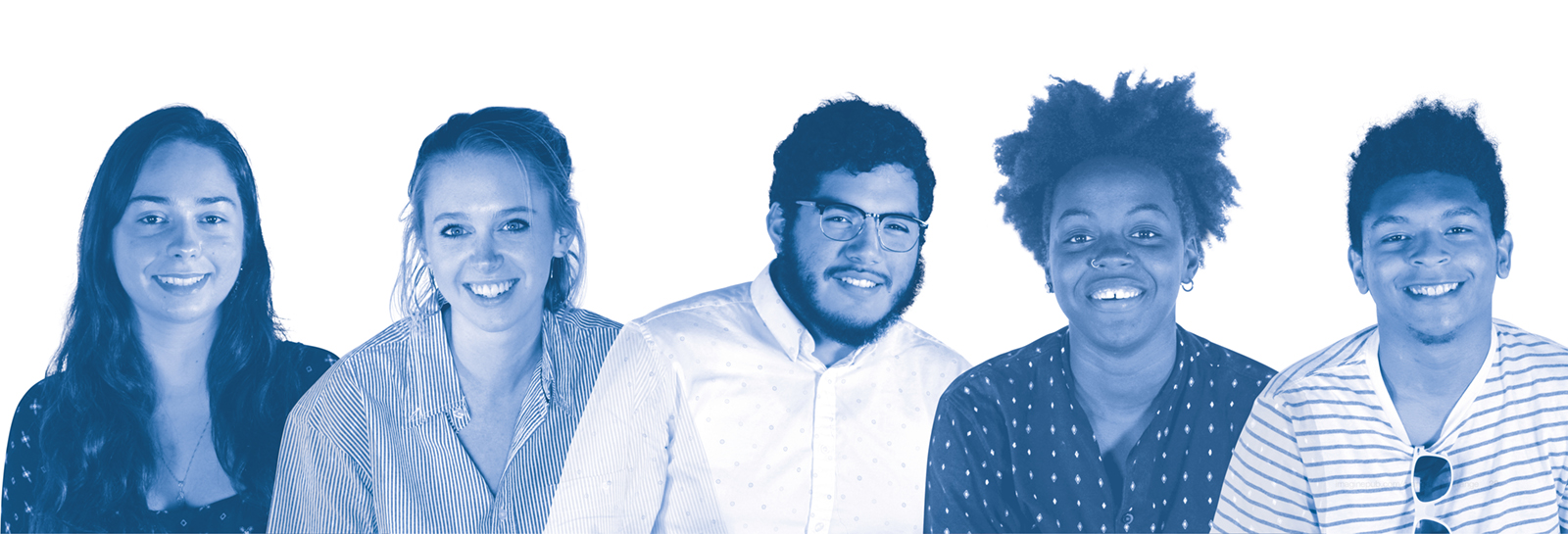Generation Z—born between 1995 and 2012—is your youngest group of brand consumers, customers and employees. Remember when you got your first BlackBerry? Yeah, Gen Zers weren’t even alive. Raised on touch screens and nonstop connectivity, they’re diverse, social-savvy and open to brands that get them.
Imagination sat down with five Gen Zers in our Chicago HQ to get their take on how content marketers should—and definitely should not—try to connect with them. We asked about branding, the media and how they consume content. Our findings? They don’t all hate Facebook. They’re willing to read long-form content. They demand to be addressed on their terms. And they’ve got a lot to say.
Meet our Gen Z 5
- Ioana Chindris, 20, pre-med student at Northwestern University. Born in Chicago and grew up in Romania. Thinks Instagram Stories rolling out after Snapchat’s My Story was a total copycat move.
- Ellen Turner, 22, junior video project manager at Imagination. Reads The Atlantic every single day. Creator of fake vlogs on Snapchat.
- Uriel Preciado, 20, sound engineering student at Tribeca Flashpoint College. Self-proclaimed sneaker head. News feed looks like this: Complex News, Sole Collector and Kicks on Fire.
- DaeJae Williams, 21, sound engineering student at Tribeca Flashpoint College in Chicago. Gets her daily dose of inspiration from TED Talks. Thinks parents should stay off Facebook.
- Braylan Saunders-Effort, 20, communications student at Northwestern University in Evanston, Illinois. Dances on his school’s folk-Indian dance team. Connects with friends on Facebook Messenger and Snap Map.
They love authenticity
What brands do you like? Do you trust brand messaging, and is it welcome in your feeds?
DJW: “I like Vans because I’m into music, and they work with a lot of artists. So they literally email you like, ‘Oh, you can do this. RSVP and you can do it for free.’ I just went to the Jamila Woods video release party, and if it wasn’t for Vans, then I wouldn’t have known about it.”
ET: “I’m going to trust (brands) little bit more if they’re showing people being who they actually are. We’re all trying to be the best people that we can be, so looking at people who are the best people that they already are is really inspiring, and I’m more likely to trust that brand.”
UP: “I love Kanye West. Even though he does a lot of out-there stuff, his mentality has really helped shape my self-confidence. So when Kanye does something with Adidas, I’ll trust Adidas fully.”
ET: There’s not a face to Uber that anybody trusts. Uber’s on the back of my Metra pass, and I just think it’s stupid. It’s like, ‘Uber and Metra are getting you to where you need to be,’ and I’m just like, ‘No, you’re not.’”
“Collecting information about me never bothered me because it’s more personalized. Unless I’m doing something incredibly sketch, incredibly wrong, I have nothing to worry about.”
BRAYLAN SAUNDERS-EFFORT
Do you think brands have a role to play in society beyond selling products and services?
IC: “It would be nice if they would encourage different social change, different good things in the community, improvement of self or things like that. It would definitely encourage me to buy from that brand if I see, for example, Adidas helping clean out the ocean.”
ET: “I think it all depends on the messaging. If you’re a brand with enough money to do something and you actually want to make a change, then you should. Say you’re a brand who’s going to allocate part of your revenue to clean up the environment. People are going to scrutinize (you) if you’re not looking at the parts of your company where you could actually be sustainable already.”
UP: “I mean, a lot of brands do things without the public knowing. I know Bill Gates has billions. And you don’t always hear about what he does, but he and his wife have a website for free college textbooks. Sometimes you don’t always hear about what these brands are doing.”
When brands ask for information about you, do you play the game or stay away?
BSE: “I’d prefer (brands) collecting as much information about me as they can because then they better target ads for me. Collecting information about me never bothered me because it’s more personalized. Unless I’m doing something incredibly sketch, incredibly wrong, I have nothing to worry about.”
UP: “I imagine this world where a brand knows you so well that they send you a text of a new product, and if you want it, you just say, ‘Yes.’ And that’s that.”
They’re sick of the media slamming them
Where do you go for news and entertainment? What outlets do you avoid?
UP: “I get my news from the YouTube channel The Young Turks or Complex sometimes. A lot of older, traditional brands are trying to appeal to us, but they’re using old tactics that are more for the older generations than for us. They’re trying to marginalize us, and they just make it seem like we don’t know what we’re doing. If you really look at it, we’re the most progressive generation of all time. We’re out here trying to make the world a better place, but they’re more worried about what shoes and what kind of cats we like. The reason I trust Complex is because you can see the humanity in it. They do things in a fun way. Whereas The New Yorker sometimes does it, but it just doesn’t feel authentic.”
ET: “I agree with what Uriel said about certain types of traditional media like The New Yorker, Time and CNN. I feel like they’re trying to come after Generation Z and entice them into being more involved in news, but they are only doing that half of the time. The other half of the time they’re kind of slamming the younger generation and blaming them for things that are going on. I went to journalism school, and in journalism school, they teach you to remain unbiased 100 percent, and I do not think (the traditional news media) is unbiased today.”
DJW: “I could piggyback off of what Uriel said about Complex. I feel like they know that we’re young. They know what we like, how we like it and what we don’t like. The people who are behind it are probably our age if not a little bit older. As far as The New York Times, it’s a bunch of old-generation people. We look at them as like, ‘Well, you’re judging us too much because you don’t know us. You don’t know our story or why we do what we do.’”
Gen Z’s rules for retail
Research from Accenture reveals this generation’s digital shopping habits and how retailers need to adapt.
Focus on social media and stay nimble. Gen Zers are quick to move to the newest channel and are open to new concepts: 70 percent are either willing or can’t wait to try making purchases on social media.
Stores are here to stay. The majority prefer visiting stores to make purchases, and most make visits a multimedia/multichannel event. They engage with sales associates and comparison-shop on mobile devices in the store. Forty percent solicit opinions from friends and family before making a purchase.
The faster the better. Fifty-eight percent of Gen Z shoppers say they’d pay more than $5 for one-hour delivery. Coupling experience with speedy fulfillment will go a long way toward meeting expectations.
Don’t let feedback fall by the wayside. Forty percent of Gen Zers provide retailers feedback often or very often, compared to about 35 percent of millennials.
They think social is the center of the world
What social channels are you on and why?
DJW: “I love Snapchatting everything. And I get a lot of positive feedback. A lot of people are afraid to be outgoing and afraid to go to different places. Not all, but for some people who can express themselves through Snapchat, it’s a way of getting people to see their inside world and what it’s like for them.”
ET: “Social media really freaks me out a lot of the time, just because there’s so much pressure to have (a presence) that’s successful. And I feel like if I ever wanted to have an Instagram, it would have to be built as a brand, in a way. Snapchat is the only form of social media that I use because celebrities can use it, brands use it, and it feels less curated than Instagram. Snapchat is wherever you are throughout your day. It’s like an insight into a life.”
IC: “I personally like Snapchat, especially after the latest updates where you get to see the stories from different areas where you are. I travel between two countries—Romania and the United States—and it’s really cool to see the different events that are going on around the cities that I’m around. I can show up and participate in those things and just have that opportunity to see them through an easier thing instead of searching on the internet. At the same time, you get to talk to people. This is a more private way to communicate with people and have that kind of personal space.”
BSE: “Facebook is where I get most of my news. I enjoy getting the headlines from there and then researching more. I enjoy Facebook, and content-wise, it’s grown so much since its creation. And I love the added reactions and all the different ways you can post and all the customization.”
DJW: “When Facebook first came out, it was great because we were young and we got to explore and express ourselves, but as time went on, they opened the platform up for people who were a generation or even generations older than us. It caused a lot of conflicts because it’s a lot of things that we don’t want our parents to see. That was our place of privacy and now, if you have them on the same page as you, then you have to watch what you do.”
They’re cool with you being in their feed
Do you recognize sponsored content? Is it reputable or a turnoff?
UP: “Brands have to make their money somehow. I mean, some ads are annoying, but what Adidas is doing to entice us to trust in their brand is—I don’t know if you’ve seen their latest commercial, ‘Original Is Never Finished’? Even though it’s out-there, it’s super colorful and super creative. It’s using a lot of artists that we listen to. I know Nicki Minaj is in it, Young Thug. I don’t listen to those artists, but a vast majority does, which entices people to trust in Adidas.
IC: “On Snapchat, the advertisements are very short. It’s literally a couple of seconds between whatever stories you’re watching, but those couple of seconds are very colorful, very active. And so they do grab your attention more, and that actually gets me to pay more attention to who’s advertising.”
“We’re out here trying to make the world a better place, but they’re more worried about what shoes and what kind of cats we like.”
URIEL PRECIADO
They’re willing to check out long-form — but it has to rock
Some marketers believe shorter content is the best way to reach younger consumers. Is this true of how you consume media?
IC: “I do feel like we are a lot more used to having things quickly. Having smartphones now, you can search something immediately. Articles tend to be a lot shorter and they try to just have one specific point to get at your attention. Shorter things tend to connect, at least personally to me more, even talking about the advertisements that we see on social media.”
DJW: “I think it depends because I like to research certain things to teach myself stuff that I don’t know, and I feel like with the longer content, you may pick up things that you wouldn’t normally.”
BSE: “I guess I do find myself reading longer articles. If I start reading and I notice it’s not coming to an end, I’ll scroll down to see how long it is, and I might stop reading if it’s too long and I’m not that interested. It’s the same with videos. I’ll look at how long the video is, and I might just cut it short halfway through.”




